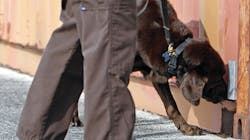Lately I’ve seen many news reports of a U.S. Supreme Court case involving K9 searches. The particular case I’ve been seeing has to do K9 Franky from the Miami-Dade Police Department and an arrest that was made in December 2006. Let me start off by saying that I have not read the police report and am not going to speculate on what was done and whether it was legal or not. What I am going to discuss is the transcript from the latest oral argument before the Supreme Court on October 31, 2012 (Florida v. Joelis Jardines). It was a long read, and full of the typical interpretations of the law and constitution.
The basis of the case is this…a MDPD officer, his canine and another officer approached a house to do a knock and talk. While approaching the house, the canine was doing what dogs do, sniff, this one just happened to be trained for narcotics detection. The canine picked up a scent and started to bracket, honing in on the source. The officers where headed to the front door, which is where the canine lead them and sniffed at a crack in the bottom of the door, then sat down indicating the source. What exactly happened after that isn’t explained in the transcript.
Let’s break that down a bit. The officers were at the residence to do a knock and talk. It had been conceded in Florida court that the officers were lawfully present at the front door. If I understand it correctly, the defense attorney is trying to say that bringing the narcotics detection canine for the knock and talk was a violation of the defendant’s fourth amendment rights. During the argument, the Supreme Court cited Kyllo v. United States – 533 U.S. 27, which they read as:
“We think that obtaining by sense-enhancing technology any information regarding the interior of the home that could not otherwise have been obtained without physical intrusion into a constitutionally protected area constitutes a search, at least where, as here, the technology in question is not in general public use.”
In the case of Kyllo, a thermal imaging camera was used to conduct a search. The defense argued that by using a narcotics detection canine, the police were using “sense-enhancing technology”. It sounded to me like the Supreme Court was not buying that argument and neither do I. A canine is not technology, it is using the same sense of smell that we have; just it is much more sensitive than ours. In comparison, a human has about five or six million olfactory receptors, whereas a dog has about 220 million. Who hasn’t taken their pet dog out for a walk and it is sniffing at everything. The only real difference is that a narcotics detection canine is trained to sniff for specific smells and alert us to that smell. In a way I look at it as an advanced level of obedience, not technology. We train our canines to heal, sit, down, come, etc, etc, including narcotics detection. Where is the technology, a veterinarian didn’t surgically enhance the canines sense of smell in any way. During the bantering, it was argued whether it would be legal for a neighbor and their dog to approach the front door. Of course it would be, but the defense wanted to try and make an argument of there being a difference between the common house dog and a narcotics detection canine. Personally, I see a narcotics detection canine as your partner, no different than a human partner. But that is just my opinion. Basically the defense was trying to say that the canine was trespassing. I realize that the defense is trying to get the defendant out of the charges, but in my opinion if the police officers are lawfully present, then their canine would also be lawfully present.
An attorney for the petitioner (State of Florida) cited the case of Florida v. Riley as being similar to this case. In the Riley case, officers used a helicopter to do surveillance of a house and observed marijuana. In the Jardines case, a narcotics detection canine is used to smell the odor of marijuana that is being pumped out of the residence. The defendant knew the smell was being pumped out and was attempting to mask the smell with mothballs. The attorney stated, “People don’t have a legitimate expectation of privacy, this Court has held, in things that they knowingly expose to the public, even in the home.” The attorney went on to say, “And I think, here, one way to resolve it is to say people who live in grow houses with a distinct odor of marijuana, who know that that is being pumped out into the street because of air conditioning that they need to run the grow houses, there is no invasion in their – in their expectation of privacy when either a man or a dog, when lawfully present on the property, uses their God-given senses to detect that.” I certainly agree with this attorney, who further strengthens my opinion that if a police officer is lawfully present, then so is their canine partner.
The transcript was seventy-eight pages long; as you can image there was a lot more discussed in the transcript than what I have discussed above. The Supreme Court justices will be making a ruling on this case sometime in 2013. At that time I will discuss the final ruling and how it affects you.
One last point I would like to make…yearly we have required in-service training, which typically includes legal updates. Those legal updates don’t generally include canine issues, but they may. If you’re a canine handler, you should be staying as up to date as you can on all legal issues involving canines. While you’re working, make sure you are staying in compliance with all state laws, case law and the constitution. Our jobs are tough enough without getting more restrictions put on us by the courts.
Stay Safe!

Steven Forgues
Steve Forgues started his career over 18 years ago in Arizona. Over the years, Forgues has worked contract security, police, corrections and tactical operations. Forgues has been an instructor in various disciplines since 1998, and has been working and training with canines since 2000. Forgues has also been writing for law enforcement since 2005. He is currently working as a police officer and firefighter in Pennsylvania.



